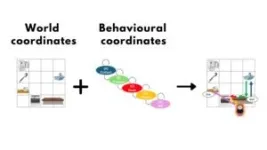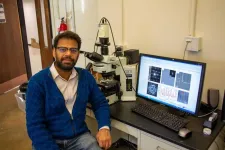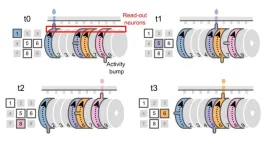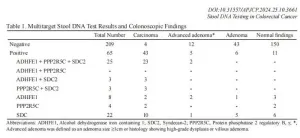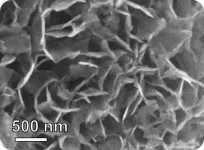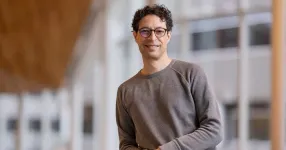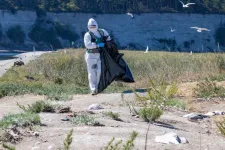(Press-News.org) Mount Sinai researchers have discovered for the first time a neural mechanism for memory integration that stretches across both time and personal experience. These findings, reported in Nature, demonstrate how memories stored in neural ensembles in the brain are constantly being updated and reorganized with salient information, and represent an important step in deciphering how our memories stay current with the most recently available information. This discovery could have important implications for better understanding adaptive memory processes (such as making causal inferences) as well as maladaptive processes (such as post-traumatic stress disorder, or PTSD).
“The long-held view is that memories are formed during initial learning and remain stable in neural ensembles over time, enabling us to recall a particular experience,” says Denise Cai, PhD, Associate Professor of Neuroscience at the Icahn School of Medicine at Mount Sinai and senior author of the study. “Our work with mouse models shows the inadequacy of this theory, since it doesn’t account for how the brain can both store memories while flexibly updating them with new and relevant information. This combination of stability and flexibility within neural ensembles is critical for us to make everyday predictions and decisions, and to interact with an ever-changing world.”
The fundamental question of how we dynamically update memories as we encounter fresh information has continued to challenge neuroscientists. For their study, the Mount Sinai team tracked the behavior and neural activity in the hippocampus of adult mice as they learned new experiences, rested after each experience (during so-called “offline” periods), and recalled past memories in the following days. Researchers found that after each event, the brain consolidates and stabilizes the memory by replaying the experience. After a negative experience, the brain replays not just that event, but memories from days earlier, seemingly searching for related events to link together and, therefore, integrate memories across time.
The study of mice that experienced a highly adverse event (e.g., receiving an foot shock in a specific environment), revealed that negative experiences drove reactivation of not only the recent adverse memory, but also of a “neutral,” or non-threatening, memory formed days earlier (a safe and different environment where they did not receive any shocks). “We learned that when mice were resting after a highly negative experience, they simultaneously reactivated the neural ensemble of that experience and the past neutral memory, thus integrating the two distinct memory modalities,” explains Dr. Cai. “We refer to this phenomenon as ensemble co-reactivation, and now know that it drives the long-term linking of memories in the brain.”
Contrary to published literature showing how sleep seems to benefit memory storage, researchers found that memory linkage occurred more often while mice were awake than asleep. This finding raised interesting questions for the team about the distinct roles that wakefulness and sleep play in different memory processes. The research also showed that adverse experiences were more likely to be linked with past memories, or “retrospectively,” than “prospectively” across days, and that more intense negative events were more likely to drive retrospective memory-linking.
“In discovering a complex neural mechanism that facilitates memory integration, we’ve taken a major step in the direction of better understanding real-world memory, where we know that our memories are constantly being updated and remodeled with subsequent experience so that we can function day-to-day in a dynamic world,” said Dr. Cai.
About the Mount Sinai Health System
Mount Sinai Health System is one of the largest academic medical systems in the New York metro area, with 48,000 employees working across eight hospitals, more than 400 outpatient practices, more than 600 research and clinical labs, a school of nursing, and a leading school of medicine and graduate education. Mount Sinai advances health for all people, everywhere, by taking on the most complex health care challenges of our time—discovering and applying new scientific learning and knowledge; developing safer, more effective treatments; educating the next generation of medical leaders and innovators; and supporting local communities by delivering high-quality care to all who need it.
Through the integration of its hospitals, labs, and schools, Mount Sinai offers comprehensive health care solutions from birth through geriatrics, leveraging innovative approaches such as artificial intelligence and informatics while keeping patients’ medical and emotional needs at the center of all treatment. The Health System includes approximately 9,000 primary and specialty care physicians and 11 free-standing joint-venture centers throughout the five boroughs of New York City, Westchester, Long Island, and Florida. Hospitals within the System are consistently ranked by Newsweek’s® “The World’s Best Smart Hospitals, Best in State Hospitals, World Best Hospitals and Best Specialty Hospitals” and by U.S. News & World Report's® “Best Hospitals” and “Best Children’s Hospitals.” The Mount Sinai Hospital is on the U.S. News & World Report® “Best Hospitals” Honor Roll for 2024-2025.
For more information, visit https://www.mountsinai.org or find Mount Sinai on Facebook, Twitter and YouTube.
###
END
The atoms of amorphous solids like glass have no ordered structure; they arrange themselves randomly, like scattered grains of sand on a beach. Normally, making materials amorphous — a process known as amorphization — requires considerable amounts of energy. The most common technique is the melt-quench process, which involves heating a material until it liquifies, then rapidly cooling it so the atoms don’t have time to order themselves in a crystal lattice.
Now, researchers ...
Ghent, 7 November 2024 – Scientists have uncovered how certain E. coli bacteria in the gut promote colon cancer by binding to intestinal cells and releasing a DNA-damaging toxin. The study, published in Nature, sheds light on a new approach to potentially reduce cancer risk. The study was performed by the teams of Prof. Lars Vereecke (VIB-UGent Center for Inflammation Research) and Prof. Han Remaut (VIB-VUB Center for Structural Biology).
Bacteria and colon cancer
Colon cancer ranks as the third most prevalent and deadliest type of cancer. Alarmingly, its incidence is rising, particularly ...
Neuroscientists have discovered brain cells that form multiple coordinate systems to tell us “where we are” in a sequence of behaviours. These cells can play out different sequences of actions, just like a music box can be configured to play different sequences of tones. The findings help us understand the algorithms used by the brain to flexibly generate complex behaviours, such as planning and reasoning, and might be useful in understanding how such processes go wrong in psychiatric ...
Some patients being treated with immune checkpoint inhibitors, a type of cancer immunotherapy, develop a dangerous form of heart inflammation called myocarditis. Researchers led by physicians and scientists at the Broad Institute of MIT and Harvard and Massachusetts General Hospital (MGH), a founding member of the Mass General Brigham healthcare system, have now uncovered the immune basis of this inflammation. The team identified changes in specific types of immune and stromal cells in the heart that underlie myocarditis and pinpointed factors in the blood that may indicate ...
Families purchased more school lunches and breakfasts the year after the federal government toughened nutritional standards for school meals. A new University of California, Davis, study suggests that families turned to school lunches after the Obama administration initiative was in effect to save time and money and take advantage of more nutritious options.
Researchers looked at the purchasing habits of nearly 8,000 U.S. households over two years — one year before and after the change in standards. The results have important implications for policymakers and researchers, but also food manufacturers and retailers, researchers said.
The study, ...
A recent prospective cross-sectional study in Thailand demonstrates that multitarget stool DNA testing is highly sensitive and specific for detecting colorectal cancer (CRC) among Thai individuals. Researchers believe that this testing method could serve as a viable non-invasive alternative to colonoscopy, especially in settings where colonoscopy is less accessible or less accepted by patients.
This study was conducted by BGI Genomics in 2023, in collaboration with Professor Varut Lohsiriwat’s team from the Faculty of Medicine, Siriraj Hospital, Mahidol University, Thailand. ...
Exhaled breath contains chemical clues to what’s going on inside the body, including diseases like lung cancer. And devising ways to sense these compounds could help doctors provide early diagnoses — and improve patients’ prospects. In a study in ACS Sensors, researchers report developing ultrasensitive, nanoscale sensors that in small-scale tests distinguished a key change in the chemistry of the breath of people with lung cancer. November is Lung Cancer Awareness Month.
People breathe out many gases, such as water vapor and carbon dioxide, as well as other airborne compounds. Researchers ...
A Joint research team (Prof. Jun-hee Lee, Hyun-koo Kim, Jin-Wook Hwang, Jae-Ho Chung, the Department of Thoracic and Cardiovascular Surgery, Korea University College of Medicine) Announced the world's first compartive results of single-port robotic thymectomy using the single-port robotic system.
The team compared and analyzed the perioperative outcomes of 110 cases of robotic thymectomy using the single-port robotic system and conventional video-assisted thoracic surgery(VATS) thymectomy from November 2018 to May 2024. The results showed that all robotic thymectomy performed were successfully ...
One out of 100 people will experience a psychotic episode in their lifetime, and these usually appear in late adolescence or early adulthood. A Canada-US team consisting of Sylvain Bouix, from École de technologie supérieure (ÉTS), Martha E. Shenton and Ofer Pasternak, from the Brigham and Women’s Hospital (Harvard University), and René Kahn, from Mount Sinai Hospital (New York) has just received US $33 million in funding—the equivalent of CAD 45 million—over five years from the National Institute of Mental Health ...
PULLMAN, Wash. – An epidemiological study found that 56% of a large breeding colony of Caspian terns died from a 2023 outbreak of highly pathogenic avian influenza at Rat Island in Washington state. Since then, no birds have successfully bred on the island, raising concerns that the outbreak may have had a significant impact on an already declining Pacific-coast population.
As part of the study, a team including Washington Department of Fish and Wildlife (WDFW) as well as Washington State University researchers also documented that the avian flu virus H5N1was transmitted to harbor seals for the first time in the northeastern ...

